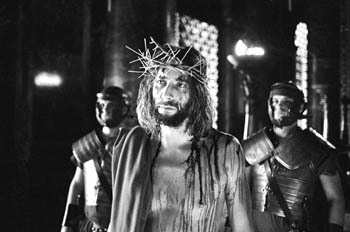![[Metroactive Movies]](/gifs/movies468.gif)
[ Movies Index | Show Times | Santa Cruz | Metroactive Home | Archives ]
Passion Playdates
Crucifix season opens--Mel's 'Passion' vs. 'The Gospel of John'
By Richard von Busack
Call it Greene's Law, in honor of Graham Greene, who noticed the phenomenon in Peru: The poorer the nation, the bloodier the crucifixes in their churches. Jesus can only win hearts and minds by looking worse off than the most starving Indian. By contrast, Connecticut Episcopalians gaze on crucifixes that are almost abstract, like the nonobjective metal sculptures outside a federal building.
Greene's Law suggests that Mel Gibson's The Passion of the Christ (which opens Feb. 25) may not be a flop after all; there are a lot of poor people out there. The sight of James Caviezel's Jesus getting it in the good old proper style may transcend the Aramaic dialogue and the subtitles--not to mention the implication that the Jews were responsible for the crucifixion. Maybe the controversial movie will triumph over another cruciflick, The Gospel of John, which just got rushed into theaters.
What's it like for those raised without crucifixes on their walls to see the grisly icons that ex-cons and reformed bullies favor? They're what George Bernard Shaw meant when he sniped, "Christianize the savage, and you make Christianity savage." San Francisco found-footage wizard Jay Rosenblatt made a brilliant short film titled King of the Jews about the feelings of horror and guilt he experienced upon seeing the crucifixion for the first time.
Rosenblatt was a Jewish kid whose mother took him to see the 1961 movie King of Kings without realizing what it was going to be about. Years later, Rosenblatt turned this feeling of horror into a film, using a collage of crucifixions harvested from 100 years of movies.
Rosenblatt says he doesn't intend to see The Passion of the Christ. "The whole approach to this is disgusting. It's unbelievable to me that, in this day and age, somebody would be propagating an idea that caused so much damage. The implication that the Jews killed Jesus, the 'may his blood be upon us'" (a scene that Gibson filmed, then deleted) "has been refuted by modern scholars. Gibson's gone back to the way things were 40 or 50 years ago. His father's a Holocaust revisionist, and Gibson himself said, when he was asked about the Holocaust, 'Well, a lot of people were killed in the Holocaust, not just Jews.' It's like code."
Gibson may be a throwback Catholic, but he's attuned to the Hollywood movie tradition that ordeals make you a better person. The Passion of the Christ marks a natural trajectory in Gibson's career, from Mad Max to "Braveheart" Wallace's drawing and quartering, then straight to the cross.
Despite Gibson's attempt to shock some religious feeling into us sinners, those who saw Martin Scorsese's The Last Temptation of Christ may feel like one round was enough. Scorsese gave that crucifixion 1,000 percent. No one makes a cruciflix without stressing how much historical research they did. Still, Scorsese deserves praise for the idea that Jesus wouldn't have been hoisted high up on smooth boards, owing to the lack of good timber in Judea.
So, his Jesus (Willem Dafoe) was nailed and roped to some crooked scrubby wood, at a painful angle, and he looked like about as transcendent as a heap of bloody rags left to dry on a bush. It was about that time that I realized that despite early Catholic training by some of the church's best I was no longer as keen on watching crucifixions as I'd once been.
As ordeals go, crucifixion may be not even the most excruciating. "Well, at least it gets you out in the open air," says Matthias in Monty Python's Life of Brian. In Denys Arcand's mordant (yet pious) Jesus of Montreal, a troupe of actors re-enact the passion play. They describe what it would be like: the heat, the blood in the eyes, the stinging flies. ("Remember, this was the Middle East.") Then, after a beat, the French epigram: "It could have been worse. The Assyrians favored impalement."
Stressing the violence of the end of Jesus's life appeals to the most medieval instincts of a movie audience; the spectacle to come will, by all accounts, be evidence of an impoverishment in the mind of one of the movie industry's wealthiest actors.
[ Santa Cruz | Metroactive Central | Archives ]
Copyright © Metro Publishing Inc. Maintained by Boulevards New Media.
For more information about Santa Cruz, visit santacruz.com.
![]()

Send in the Calvary: Henry Ian Cusick as Jesus Christ in 'The Gospel of John,' which was rushed into theaters to capitalize on publicity around Mel Gibson's 'The Passion of the Christ.'
From the February 18-25, 2004 issue of Metro Santa Cruz.